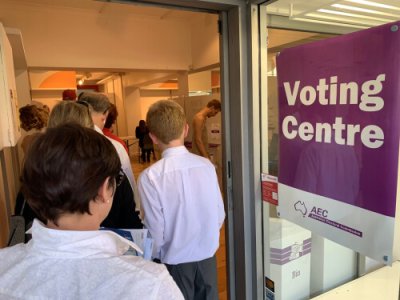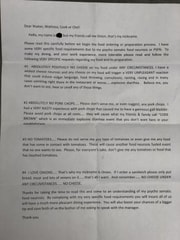Earning Extra Income With Election Day Work: The Tech Guy – Dr Al
- Replies 6
Note from the Editor:
This article was kindly written for the SDC by member Alan G, ‘The Tech Guy’.
As we progress our little lives into blissful retirement, some of us get the idea that it would be quite nice to do something useful and possibly earn money for those few nights away somewhere. One possibility is to be involved in polling stations. I have ‘done’ two Federal elections now, and I thought it would be a good idea to tell people what goes on behind the scenes.
Payment:
I decided a bit of extra money would come in handy – we’re allowed to earn a fair bit without affecting our pension. The Australian Electoral Commission paid a bit over $400 for the day, but that may have been increased by now. The first step is to go ‘online’ and express your interest in working at the polling station; you answer a few questions, and then, if you meet the requirements, they offer you a job when elections come around.
Arrival:
You have to arrive at the polling place before 7 am as the polls open at 8 am. You’re signed up to work ‘as long as it takes’ after the polls close. The first time I worked, I didn’t get home until 1 am the following morning – more about that later. This year it was ‘only’ about 11.30 pm when we were ‘let off’.
On arrival, we were given a coloured vest with ‘AEC’ on it and a lanyard depicting our particular role. I was a ‘Polling Assistant’ (including counting after 6 pm) and ‘Electoral Official 2’. My actual work on the day, each time, was to sign people in, issue voting papers, explain to them how to vote on the papers and direct them to polling booths. The ‘orientation’ talk we were given as we all sat around in a circle before 8 am included instructions on what we were to do in each of the positions to which we may be assigned. For instance, I could have been assigned to look after the queue of people, direct people to an empty issuing point, guard ballot boxes or simply direct voters who required assistance. They planned to move us around during the day to other positions, but my experience was that if they saw you doing well at (say) the issuing point, they’d leave you there. The object was to get people through as quickly as possible to keep the queue down.
All the polling booths had been set up when we arrived, and just about everything was ready. I was sitting at an issuing point, and we each had a large (small printed) book with all the names on the electoral roll for the district. I found I definitely needed my reading glasses! I wish I’d taken a cushion with me as well – those plastic chairs get quite uncomfortable after a couple of hours. We were due for breaks of 15 minutes at a maximum of 5 hours of work but were allowed 30 minutes for lunch, which we were expected to have brought with us. Depending upon the supervisor, we had shorter breaks more often than that, probably to stretch our legs, etc. and we could always ask for a couple of minutes ‘loo break’.
Informal and Formal Voting:
The voters had to be told to mark every square in numbered order of preference on the House of Representatives (HOR) paper – in our case, I think there were six boxes to mark, so they had to number ‘1’ to ‘6’. On the large Senate paper, they had to mark boxes ‘1’ to ‘6’ above the line as a minimum requirement or ‘1’ to ‘12’ below the line, once again, as a minimum. If they wanted to, they could continue numbering all the boxes. That was our instruction to voters anyway, and it agreed with what was on the paper and given on instructional videos that could be accessed online from the Australian Electoral Commission (AEC).
I also told people that numbering above the line on the Senate paper meant that the party you were marking directed your preference to where THEY wanted it to go, but if you numbered boxes ‘below the line’, preferences could be directed to where YOU wanted them to go. This was not on our instructional talk or videos.
With regard to ‘informal’ voting, there was a booklet explaining to all potential workers what was and what was not an informal vote. This was also made clear in instructional videos we were supposed to look at before we turned up at the polling place. It was with some surprise then that clear instructions were given to the voter concerning the voting procedure that contradicted that. For instance, a single number ‘1’ on the top line of the Senate paper was a formal vote – perfectly OK. Also, in my first election employment, we were also told that a single number, tick or cross on the HOR paper was a formal vote. I reckon that if voters were told that at the outset, we would have had far fewer informal votes.
Incidentally, Australia is the only country in the world that appears to have the STV system (Single Transferable Vote) for the upper house (Senate) and IRV (Instant Run-off Voting) for the lower house (HOR). Also, most countries that have the ‘compulsory’ voting system (and there aren’t that many) do not enforce it – especially for those over 70 years old. Aren’t we lucky?
Supervisors, Organisation and Vote Counting:
Depending upon the supervisor on the day, things could go well or not. During my recent stint, we had a really good supervisor. She was young and worked at the school where we had the polling place, I believe. Apparently, teachers had been asked if they would like to be supervisors at the next election, and she’d put her hand up for it – to ‘challenge’ herself, she said. I wished I’d been asked! Anyway, she supplied biscuits, tea and coffee, and I reckon she was really good. We also had somebody there in an upper supervisory role who seemed to know what he was doing in general. This knowledge was invaluable in the counting process after 6 pm. It was a very lengthy process, and a definite procedure had to be adhered to in order to finish as soon as possible.
In my first election a few years ago, the counting procedure was really hopeless. No tables had been organised on which to lay the large Senate papers, so we had to lay them on the floor. After a few hundred of those, your back tells you it has had enough! In that election, because of the incredibly poor organisation and hopelessly inept supervisors, we ‘lost’ informal votes ‘in the wrong pile’ and had to recount several times, and there was a change of mind about what was an informal vote a couple of times, then they ‘decided’ that ‘One Nation’ had received enough votes for them to be regarded as a ‘major party’ and that demanded another re-count and sort, and so on and so on. That’s why we were still there at 1 am! Luckily, at the recent election, things were a lot different, and we were home, as I said, by 11.30 pm. To be fair, I complained to the AEC regarding that earlier election where I was employed and received extra money for the time we’d spent.
Conclusions:
So, what’s the up-side? Well, you get to meet some really nice people, you do an essential and worthwhile job, and you get paid a pretty good rate. I might disagree with compulsory voting in a democratic society, supposedly, and I might moan about our complicated preferential voting system, but at least we don’t end up with bozos that lie and exaggerate repeatedly, act in a Caligula-like manner, disposing of all opposition, surround themselves with ‘yes-men’ (and women) and think that the Moon is part of Mars! Don’t get me started!
About the author: Having spent three years living in Australia in his youth, Alan returned to Australia in 1969 with his wife and young child. Holding a Bachelor of Engineering degree and a Doctor of Science Education degree, Alan has experience in flight simulations, Einsteinian physics, and inventing an ‘eye blink’ device that allows cerebral palsy patients to communicate. He even took a turn at acting, starring in a TV advert and landing supporting and lead roles in his local dramatic society plays. His short stories have been published in WA’s The Gingin Buzz for ten years, and his novel The Magic Hourglass is a work in progress. He and his wife have a lovely life in Brisbane and regularly visit their two children in Sydney’s West. You can read Alan’s full-length bio here.
From the Editor:
Have you ever worked at a state or federal election? I’ve worked for the AEC twice now, once as a polling official like Alan and once as a Declaration Voting Officer. I thought the money was good, but it was a very long day.
Disclaimer: This is general advice and a personal recount. Please consider whether this is right for you or would push you over the income limit for your pension.
We were only able to create this content because of the financial support of SDC Rewards members. If you'd like to see more of this (and a lot fewer ads!), please consider supporting us and signing up for SDC Rewards today—it costs less than a cup of coffee per month.
This article was kindly written for the SDC by member Alan G, ‘The Tech Guy’.
As we progress our little lives into blissful retirement, some of us get the idea that it would be quite nice to do something useful and possibly earn money for those few nights away somewhere. One possibility is to be involved in polling stations. I have ‘done’ two Federal elections now, and I thought it would be a good idea to tell people what goes on behind the scenes.
Payment:
I decided a bit of extra money would come in handy – we’re allowed to earn a fair bit without affecting our pension. The Australian Electoral Commission paid a bit over $400 for the day, but that may have been increased by now. The first step is to go ‘online’ and express your interest in working at the polling station; you answer a few questions, and then, if you meet the requirements, they offer you a job when elections come around.
Arrival:
You have to arrive at the polling place before 7 am as the polls open at 8 am. You’re signed up to work ‘as long as it takes’ after the polls close. The first time I worked, I didn’t get home until 1 am the following morning – more about that later. This year it was ‘only’ about 11.30 pm when we were ‘let off’.
On arrival, we were given a coloured vest with ‘AEC’ on it and a lanyard depicting our particular role. I was a ‘Polling Assistant’ (including counting after 6 pm) and ‘Electoral Official 2’. My actual work on the day, each time, was to sign people in, issue voting papers, explain to them how to vote on the papers and direct them to polling booths. The ‘orientation’ talk we were given as we all sat around in a circle before 8 am included instructions on what we were to do in each of the positions to which we may be assigned. For instance, I could have been assigned to look after the queue of people, direct people to an empty issuing point, guard ballot boxes or simply direct voters who required assistance. They planned to move us around during the day to other positions, but my experience was that if they saw you doing well at (say) the issuing point, they’d leave you there. The object was to get people through as quickly as possible to keep the queue down.
All the polling booths had been set up when we arrived, and just about everything was ready. I was sitting at an issuing point, and we each had a large (small printed) book with all the names on the electoral roll for the district. I found I definitely needed my reading glasses! I wish I’d taken a cushion with me as well – those plastic chairs get quite uncomfortable after a couple of hours. We were due for breaks of 15 minutes at a maximum of 5 hours of work but were allowed 30 minutes for lunch, which we were expected to have brought with us. Depending upon the supervisor, we had shorter breaks more often than that, probably to stretch our legs, etc. and we could always ask for a couple of minutes ‘loo break’.
Informal and Formal Voting:
The voters had to be told to mark every square in numbered order of preference on the House of Representatives (HOR) paper – in our case, I think there were six boxes to mark, so they had to number ‘1’ to ‘6’. On the large Senate paper, they had to mark boxes ‘1’ to ‘6’ above the line as a minimum requirement or ‘1’ to ‘12’ below the line, once again, as a minimum. If they wanted to, they could continue numbering all the boxes. That was our instruction to voters anyway, and it agreed with what was on the paper and given on instructional videos that could be accessed online from the Australian Electoral Commission (AEC).
I also told people that numbering above the line on the Senate paper meant that the party you were marking directed your preference to where THEY wanted it to go, but if you numbered boxes ‘below the line’, preferences could be directed to where YOU wanted them to go. This was not on our instructional talk or videos.
With regard to ‘informal’ voting, there was a booklet explaining to all potential workers what was and what was not an informal vote. This was also made clear in instructional videos we were supposed to look at before we turned up at the polling place. It was with some surprise then that clear instructions were given to the voter concerning the voting procedure that contradicted that. For instance, a single number ‘1’ on the top line of the Senate paper was a formal vote – perfectly OK. Also, in my first election employment, we were also told that a single number, tick or cross on the HOR paper was a formal vote. I reckon that if voters were told that at the outset, we would have had far fewer informal votes.
Incidentally, Australia is the only country in the world that appears to have the STV system (Single Transferable Vote) for the upper house (Senate) and IRV (Instant Run-off Voting) for the lower house (HOR). Also, most countries that have the ‘compulsory’ voting system (and there aren’t that many) do not enforce it – especially for those over 70 years old. Aren’t we lucky?
Supervisors, Organisation and Vote Counting:
Depending upon the supervisor on the day, things could go well or not. During my recent stint, we had a really good supervisor. She was young and worked at the school where we had the polling place, I believe. Apparently, teachers had been asked if they would like to be supervisors at the next election, and she’d put her hand up for it – to ‘challenge’ herself, she said. I wished I’d been asked! Anyway, she supplied biscuits, tea and coffee, and I reckon she was really good. We also had somebody there in an upper supervisory role who seemed to know what he was doing in general. This knowledge was invaluable in the counting process after 6 pm. It was a very lengthy process, and a definite procedure had to be adhered to in order to finish as soon as possible.
In my first election a few years ago, the counting procedure was really hopeless. No tables had been organised on which to lay the large Senate papers, so we had to lay them on the floor. After a few hundred of those, your back tells you it has had enough! In that election, because of the incredibly poor organisation and hopelessly inept supervisors, we ‘lost’ informal votes ‘in the wrong pile’ and had to recount several times, and there was a change of mind about what was an informal vote a couple of times, then they ‘decided’ that ‘One Nation’ had received enough votes for them to be regarded as a ‘major party’ and that demanded another re-count and sort, and so on and so on. That’s why we were still there at 1 am! Luckily, at the recent election, things were a lot different, and we were home, as I said, by 11.30 pm. To be fair, I complained to the AEC regarding that earlier election where I was employed and received extra money for the time we’d spent.
Conclusions:
So, what’s the up-side? Well, you get to meet some really nice people, you do an essential and worthwhile job, and you get paid a pretty good rate. I might disagree with compulsory voting in a democratic society, supposedly, and I might moan about our complicated preferential voting system, but at least we don’t end up with bozos that lie and exaggerate repeatedly, act in a Caligula-like manner, disposing of all opposition, surround themselves with ‘yes-men’ (and women) and think that the Moon is part of Mars! Don’t get me started!
About the author: Having spent three years living in Australia in his youth, Alan returned to Australia in 1969 with his wife and young child. Holding a Bachelor of Engineering degree and a Doctor of Science Education degree, Alan has experience in flight simulations, Einsteinian physics, and inventing an ‘eye blink’ device that allows cerebral palsy patients to communicate. He even took a turn at acting, starring in a TV advert and landing supporting and lead roles in his local dramatic society plays. His short stories have been published in WA’s The Gingin Buzz for ten years, and his novel The Magic Hourglass is a work in progress. He and his wife have a lovely life in Brisbane and regularly visit their two children in Sydney’s West. You can read Alan’s full-length bio here.
From the Editor:
Have you ever worked at a state or federal election? I’ve worked for the AEC twice now, once as a polling official like Alan and once as a Declaration Voting Officer. I thought the money was good, but it was a very long day.
Disclaimer: This is general advice and a personal recount. Please consider whether this is right for you or would push you over the income limit for your pension.
We were only able to create this content because of the financial support of SDC Rewards members. If you'd like to see more of this (and a lot fewer ads!), please consider supporting us and signing up for SDC Rewards today—it costs less than a cup of coffee per month.









